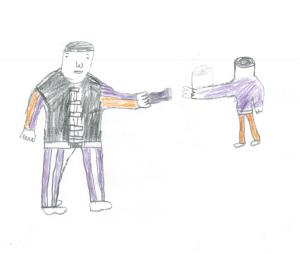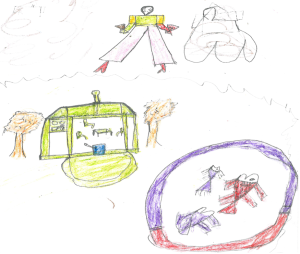In St. Louis, where I live, school is back in session. The yellow buses drive down our street several times a day, and I am reminded of the end of summer every time I walk into a store. Even still, children’s school holidays are on my mind.
I learned that an article I wrote with colleagues, entitled School Holidays: Examining Childhood, Gender Norms, and Kinship in Children’s Shorter-term Residential Mobility in Urban Zambia, is hot off the presses, published by Children’s Geographies. This article, like many academic articles, was a long time coming. The initial idea came to me “in the field” in Lusaka, Zambia during research I carried out in 2007 and 2008. Actually, it didn’t so much come to me; the children I was carrying out research with made me see school holidays as important to study. They talked about them excitedly and excessively. They made me unsolicited (but very much appreciated) drawings of what they did during their school holidays.

Mulenga: “My brother in Northmead gave me 10,000 kwacha. He promised to give me 50,000 kwacha to buy clothes.”
School holidays are a study in the meaning and practice of children’s shorter-term migrations at a time when global child welfare programs, policies, and discourses are concerned with unaccompanied minors. For the children in my study, who all came from very poor backgrounds, holidays provided breaks in day-to-day routines when a number of children left their homes to visit with relatives living in not-too-far-away places. The children I knew talked about these shorter-term residential shifts with excitement. These were times to get to know relatives, do things for relatives, and attempt to get resources from relatives to support their schooling.
What I love about participant observation and child-centered research is that both methodological traditions embrace the unanticipated. I never expected that a study of how children experienced and responded to tuberculosis illness in their families would lead to such a whimsical-sounding place. However, school holidays are anything but trivial. As we argue in the paper: “Within a context where resources are severely constrained, going on holiday may serve as one means for cultivating reciprocity, sharing the burden of care and household labor, and strengthening kin ties. This work further demonstrates the importance of using locally meaningful terms and practices in survey research where general questions about children’s mobility may fail to capture the nature and extent of children’s movements.”
To read more, see Children’s Geographies. If you have trouble accessing the article or have any comments you would like to share, do not hesitate to write me at jean.hunleth@gmail.com

